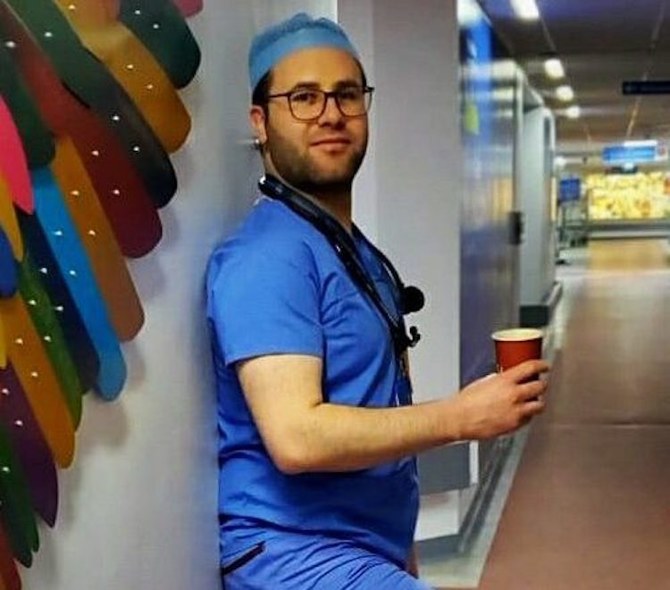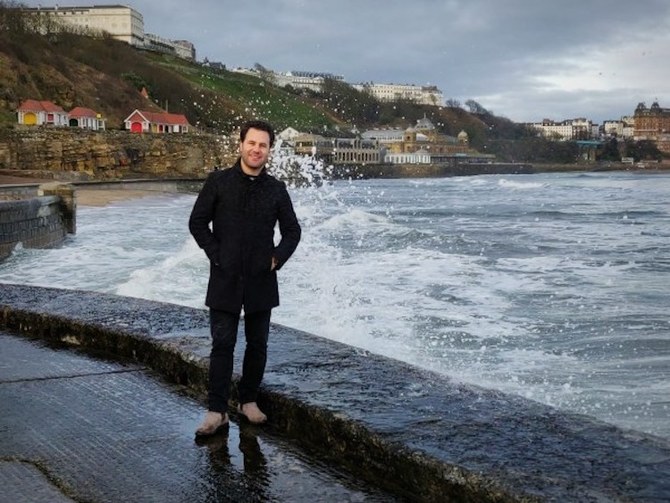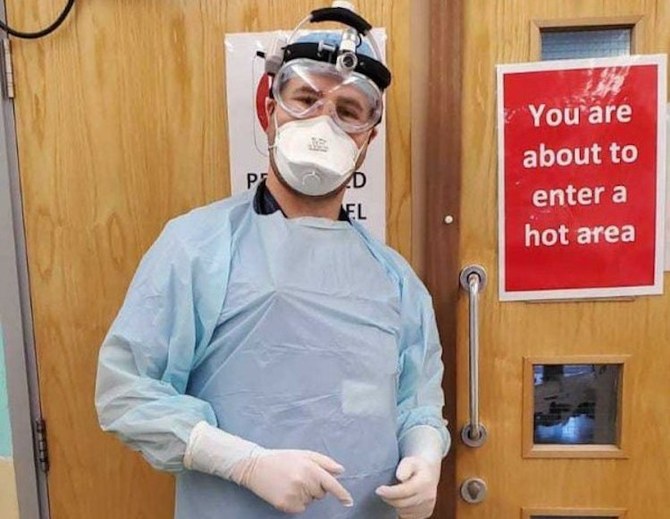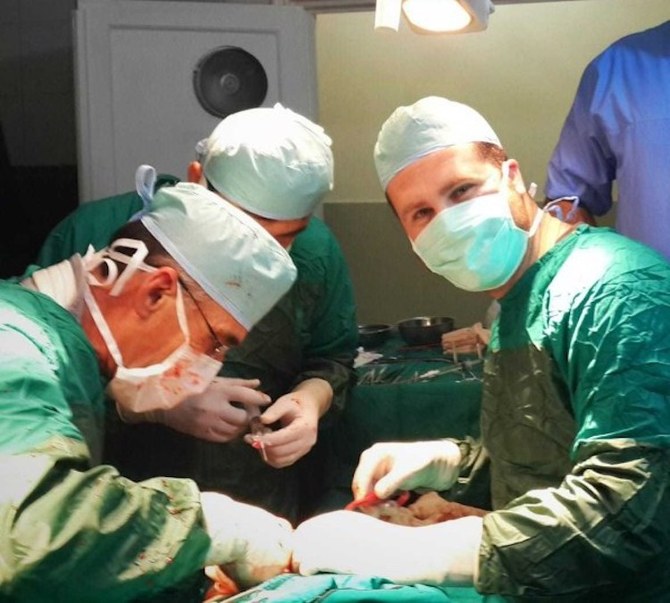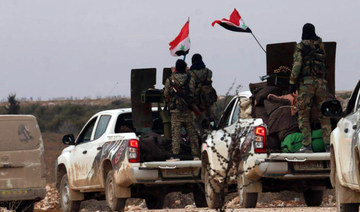LONDON: Six years ago, Dr. Mohamad Kajouj was working in a war zone, treating the horrific injuries of Syrian civilians. Today he finds himself on another front line — helping UK hospitals in the struggle to save COVID-19 victims.
Kajouj’s journey, in which he fled his war-ravaged home country, and reached Greece on a rubber raft is nothing short of incredible. But it didn’t end when he arrived in Europe.
Granted asylum in Britain despite not speaking English, the young doctor set about rebuilding his medical career.
He is one of a number of refugees working in British hospitals during the coronavirus pandemic. After the traumas that he witnessed, he can go about his work with a cool head and steady hand.
Originally from the city of Hama, he was in his fifth year as a medical student in Aleppo when the war in Syria started in 2011.
As the fighting intensified in 2012, Aleppo, once Syria’s main commercial hub, became divided between rebel and regime control. Kajouj, who was working as a junior resident in private hospitals in the government-held areas, was shocked at the suffering of civilians on the rebel side at the hands of President Bashar Assad’s forces, and took a decision that would change his life.
“All doctors in the rebel-held areas ran away and a lot of people were getting injured, so I decided I’m going to stand with those people and help them as much as I can,” he said.
“The Syrian government wasn’t happy for doctors to work for the other side and they were questioning, investigating and arresting them.”
By 2014, the situation in the city deteriorated rapidly. Rebel-held Aleppo was under heavy shelling with whole neighborhoods being destroyed, and the hospital where Kajouj worked was flooded with casualties.
Kajouj fled Syria in 2014 for Turkey, where he worked for Médecins Sans Frontières (Doctors Without Borders) along the Syrian/Turkish border, before taking the dangerous journey to Greece in a five meter-long rubber dinghy packed with more than 40 people.
“Some people had panic attacks, shouting and screaming, so reassurance was helpful, but it was a very stressful situation, very dangerous. Every time there were any high waves in the sea, everyone would get very panicked and stressed,” he said.
Kajouj was able to help some of the refugees on board, but he was also concerned that if the boat were to sink, he would lose his only valued possessions — his documents.
Kajouj studied medicine in Arabic, and also in German, although when he was granted asylum in the UK in 2015 he did not speak English. With the help of Refugee and Asylum Seekers Center for Healthcare Professionals Education (REACHE) North West, Kajouj was able to enter a program to prepare for his exams and, subsequently, job interviews.
He passed the International English Language Testing System (IELTS) exam and qualified with distinction for his medical degree in English in less than a year — something that would normally take more than two years to accomplish.
Kajouj has been working at York Teaching Hospital NHS Foundation Trust, in the north of England, as an Ear Nose and Throat (ENT) specialist and resident surgeon since March 2019.
When the COVID-19 outbreak escalated and his regular appointments were put on hold, Kajouj volunteered to work in the accident and emergency department.
His specialism now places him at the forefront of the coronavirus pandemic, something for which he is well prepared after working in a war zone.
“When I compare Syria to the UK, I can tell the huge difference between the two health care systems,” the 30-year-old ENT specialist told Arab News. “I worked in Syria during the war and there was no means of personal protective equipment (PPE); there was a huge lack of medications.”
However, the UK’s National Health Service has been stretched by the crisis, with nurses and doctors losing their lives to the disease and hospitals suffering a lack of PPE.
The UK is a “great country … considered one of the best countries around the world, in terms of quality of life, and the quality of care,” Kajouj said. “It was surprising to me by not being able to provide PPE in the right time for all the medical staff.”
“ENT is a risky specialty because you get the maximum exposure of droplets, saliva and patient secretions, so we stopped examining patients throats and we moved to treating, depending on symptoms, rather than examinations, because of the lack of PPE,” Kajouj said.
Kajouj described the UK’s response to the pandemic as “delayed” and said that action should have been taken a week or two earlier.
Kajouj is now in a better situation than he could possibly have imagined when he was witnessing the horrors of the Syria conflict.
His family back in Aleppo are happy he is safe, and he is grateful for the support he received from the medical community. While he misses his home country, he plans to continue working in the UK.
“I feel like I have a lot of duties to this country, because of the way I was treated here, it’s much better than the way I was treated in my country as a doctor.”
“Anyone would like to go back to their home, regardless of the situation,” he said. “It is not safe at the moment, but that doesn’t mean I don’t want to go back to Syria anymore. I would love to see Syria as a safe country one day, sooner rather than later, and by the time it becomes a safe country, it’s a big decision that I need to take.”
From the horror of Aleppo to the UK’s COVID-19 front line — a Syrian doctor’s journey
https://arab.news/n24y8
From the horror of Aleppo to the UK’s COVID-19 front line — a Syrian doctor’s journey

- A refugee who experienced the horrors of Aleppo is now fighting on the UK’s COVID-19 frontline
- Granted asylum in Britain despite not speaking English, the young doctor set about rebuilding his medical career
G20 leaders gather for deadlocked talks on climate, Middle East, Ukraine wars

- Wars which have bitterly divided G20 members are set to feature prominently in discussions in Brazil
- Biden will attend his last summit of world’s leading economies with China’s XI as the most influential leader
Rio de Janeiro: G20 leaders began arriving for a summit in Brazil on Monday to try reignite deadlocked climate talks and overcome their differences on the Middle East and Ukraine wars ahead of Donald Trump’s return to the White House.
US President Joe Biden will attend his last summit of the world’s leading economies, but as a lame duck leader eclipsed by Chinese President Xi Jinping, the most influential leader at this year’s meeting.
Brazil’s left-wing President Luiz Inacio Lula da Silva is using his hosting duties to promote issues close to his heart, including fighting hunger and climate change and taxing the super-rich.
But the wars which have bitterly divided G20 members are also set to feature prominently in the discussions.
A Brazilian foreign ministry source said Monday that some countries wanted to renegotiate a draft summit communique.
“For Brazil and other countries the text is already finalized, but some countries want to open up some points on wars and climate,” he told AFP.
Biden’s decision Sunday to allow Ukraine to use long-range US missiles to strike targets inside Russia — a major policy shift — could prompt European allies to also review their stance.
G20 leaders are also under pressure to try rescue UN climate talks in Azerbaijan, which have stalled on the issue of greater climate finance for developing countries.
UN Secretary-General Antonio Guterres has called for G20 members, who account for 80 percent of global emissions, to show “leadership” to facilitate a deal.
Security is tight for the gathering, which comes days after a failed bomb attack on Brazil’s Supreme Court in Brasilia by a suspected far-right extremist, who killed himself in the process.
The get-together will cap a farewell diplomatic tour by Biden which took him to Lima for a meeting of Asia-Pacific trading partners, and then to the Amazon in the first such visit for a sitting US president.
Biden, who has looked to burnish his legacy as time runs down on his presidency, insisted in the Amazon that his climate record would survive another Trump mandate.
All eyes at the stalled COP29 climate conference in Azerbaijan are on Rio to break an impasse over how to raise $1 trillion a year for developing countries to cope with global warming.
Rich countries want fast-developing economies like China and Gulf states to also put their hands in their pockets.
The meeting comes in a year marked by another grim litany of extreme weather events, including Brazil’s worst wildfire season in over a decade, fueled by a record drought blamed at least partly on climate change.
At the last G20 in India, leaders called for a tripling of renewable energy sources by the end of the decade, but without explicitly calling for an end to the use of fossil fuels.
Conspicuously absent from the summit is Russian President Vladimir Putin, whose arrest is sought by the International Criminal Court over the Ukraine war.
Lula, 79, told Brazil’s GloboNews channel on Sunday that he did not want the wars in Ukraine and the Middle East to take the focus off global poverty.
“Because if not, we will not discuss other things which are more important for people that are not at war, who are poor people and invisible to the world,” he said.
The summit opens on Monday with Lula, a former steelworker who grew up in poverty, launching a “Global Alliance against Hunger and Poverty.”
Brazil is also pushing for higher taxes on billionaires.
Lula had faced resistance to parts of his agenda from Argentinian President Javier Milei, a libertarian Trump uber-fan who met the Republican last week at his Mar-a-Lago resort.
The head of the Argentine delegation, Federico Pinedo, told AFP that Buenos Aires has raised some objections and would not “necessarily” sign the text, however. He did not elaborate.
But the Brazilian foreign ministry source on Monday downplayed the likelihood of Argentina blocking a consensus.
Why has ethnic violence escalated in India’s Manipur state again?

- On May 3, 2023, members of the Kuki and Naga tribes launched protest against extension of benefits to dominant Meiteis
- Latest violence flared this month after 31-year-old woman from Kuki tribe was found burned to death in a village in Jiribam district
Hundreds of people defied a curfew to stage demonstrations in India’s northeastern state of Manipur over the weekend and 23 were arrested for violence as tensions between two ethnic communities flared up again.
These are the reasons behind the violence in the border state.
HOW DID THE MANIPUR VIOLENCE BEGIN?
On May 3, 2023, members of the Kuki and Naga tribes, who inhabit Manipur’s hills and are regarded as Scheduled Tribes, or India’s most disadvantaged groups, launched a protest against the possible extension of their benefits to the dominant Meiteis.
The Meitei have sought special benefits for more than a decade, but received a fillip in April last year after the Manipur High Court recommended the state government should consider the demand and set a deadline of mid-May.
Meiteis account for half of Manipur’s population and extending limited affirmative action quotas to them would mean they would get a share of education and government jobs reserved for Kukis and Nagas.
Meiteis have traditionally lived in Manipur’s more prosperous valley region that makes up 10 percent of the state’s area.
They have also had better access to employment and economic opportunities. Nagas and Kukis live in the poorly developed hill regions.
The imbalance in development that has favored the valley over the hills has been a point of contention and rivalry between the ethnic groups.
WHAT WERE THE TRIGGERS?
The groups co-existed peacefully until unrelated events in 2023 exposed old faultlines.
Manipur shares a nearly 400-km (250-mile) border with Myanmar and the coup there in 2021 pushed thousands of refugees into the Indian state.
Kukis share ethnic lineage with Myanmar’s Chin tribe and Meiteis feared they would be outnumbered by the arrival of the refugees.
WHY IS PEACE YET TO RETURN?
Both the Meiteis and Kukis are known to be flush with arms, including automatic weapons either stolen from the state police or sourced from Myanmar.
The Indian Army and federal paramilitary forces in the state cannot act independently and are legally bound to work with state police and authorities, who analysts say are also divided along ethnic lines.
Kukis also accuse Biren Singh, the chief minister of the Bharatiya Janata Party-ruled state and a Meitei, of complicity in violence against them and have sought his removal. Singh denies the accusations.
WHAT IS BEHIND THE LATEST SPIRAL OF VIOLENCE?
The latest violence flared this month after a 31-year-old Kuki woman was found burned to death in a village in Jiribam district, an area that was untouched by the conflict until June.
Kuki groups blamed Meitei militants for the act.
Kukis and Meiteis have moved to separate parts elsewhere in Manipur since the clashes last year but Jiribam still has a mixed population, leading to tensions and violence.
Days after the incident, 10 armed Kuki men were killed in a gunfight with security forces after they tried to attack a police station in Jiribam district, and security forces retaliated. During this gunfight, a Meitei family of six people went missing.
On Friday, bodies of three of the six were found floating in a river, triggering angry protests in the state capital Imphal. Police said on Sunday they had arrested 23 people for ransacking and setting fire to the homes of lawmakers and ministers, in a second straight day of unrest in the area.
Emergency declared as smog in New Delhi hits highest level this year

- New Delhi was the world’s most polluted city on Monday, according to IQAir
- PM 2.5 concentration was 138.4 times higher than WHO’s recommended levels
NEW DELHI: New Delhi was in a medical emergency on Monday as toxic smog engulfing the Indian capital reached the highest level this year, prompting authorities to close schools and urge people to stay indoors.
Pollution in Delhi and the surrounding metropolitan area — home to around 55 million people — reached the “severe plus” category as some areas reached an Air Quality Index score of 484, this year’s highest, according to the Central Pollution Control Board.
On the AQI scale from 0 to 500, good air quality is represented by levels below 50, while levels above 300 are dangerous.
Delhi was ranked as the most polluted city in the world on Monday by Swiss group IQAir, with a concentration of PM 2.5, 138.4 times higher than the World Health Organization’s recommended levels.
“All of North India has been plunged into a medical emergency,” Delhi Chief Minister Atishi Marlena Singh said in a press conference, adding that many cities were “reeling under severe levels of pollution.”
She said farm fires, where stubble left after harvesting rice is burnt to clear fields, were causing the extreme levels of pollution.
“Why is the (central government) not taking action against these states and implementing concrete steps? People are unable to breathe. I am getting calls from people complaining about breathing and respiratory issues,” she said.
“All of North India is paying the price for this, especially children and elderly who are struggling to breathe.”
Authorities in Delhi have directed all schools to move classes online and tightened restrictions on construction activities and vehicle movements.
Mahesh Palawat, vice president of meteorology and climate change at forecast company Skymet Weather, said people in the capital region are faced with serious health risks.
“If they are non-smokers, then they will also inhale at least 30 to 40 cigarettes per day (at these pollution levels). So, you can imagine how bad it is for our health,” he told Arab News.
“PM 2.5 is a very minute particle (that can be inhaled). It is so minute that it can go into our blood vessels also, so it is very harmful and leads to various diseases, particularly for older people and infants who have breathing problems.”
Palawat is expecting the air quality to remain at this level for at least a few more days.
“It will remain in the very poor to serious category in coming days also,” he said.
Emergency declared in New Delhi as smog hits highest level this year

- New Delhi was the world’s most polluted city on Monday, according to IQAir
- PM 2.5 concentration was 138.4 times higher than WHO’s recommended levels
New Delhi: New Delhi was in a state of ‘medical emergency’ on Monday as toxic smog engulfing the Indian capital reached the highest levels this year, prompting authorities to close schools and urge people to stay indoors.
Pollution in Delhi and the surrounding metropolitan area — home to around 55 million people — reached the “severe plus” category as some areas reached an Air Quality Index score of 484, this year’s highest, according to the Central Pollution Control Board.
On the AQI scale from 0 to 500, good air quality is represented by levels below 50, while levels above 300 are dangerous.
Delhi was ranked as the most polluted city in the world on Monday by Swiss group IQAir, with a concentration of PM 2.5, 138.4 times higher than the World Health Organization’s recommended levels.
“All of North India has been plunged into a medical emergency,” Delhi Chief Minister Atishi Marlena Singh said in a press conference, adding that many cities were “reeling under severe levels of pollution.”
She said farm fires, where stubble left after harvesting rice is burnt to clear fields, were causing extreme levels of pollution.
“Why is the (central government) not taking action against these states and implementing concrete steps? People are unable to breathe. I am getting calls from people complaining about breathing and respiratory issues,” she said.
“All of North India is paying the price for this, especially children and elderly who are struggling to breathe.”
Authorities in Delhi have directed all schools to move classes online and tightened restrictions on construction activities and vehicle movements.
Mahesh Palawat, vice president of meteorology and climate change at forecast company Skymet Weather, said people in the capital region are faced with serious health risks.
“If they are non-smokers, then they will also inhale at least 30 to 40 cigarettes per day (at these pollution levels). So, you can imagine how bad it is for our health,” he told Arab News.
“PM 2.5 is a very minute particle (that can be inhaled). It is so minute that it can go into our blood vessels also, so it is very harmful and leads to various diseases, particularly for older people and infants who have breathing problems.”
Palawat is expecting the air quality to remain at this level for at least a few more days.
“It will remain in the very poor to serious category in coming days also,” he said.
Palestinian NGO to ask UK court to block F-35 parts to Israel over Gaza war

- West Bank-based Al-Haq is taking legal action against Britain’s Department for Business and Trade at London’s High Court
LONDON: Britain is allowing parts for F-35 fighter jets to be exported to Israel despite accepting they could be used in breach of international humanitarian law in Gaza, lawyers for a Palestinian rights group told a London court on Monday.
West Bank-based Al-Haq, which documents alleged rights violations by Israel and the Palestinian Authority, is taking legal action against Britain’s Department for Business and Trade at London’s High Court.
Israel has been accused of violations of international humanitarian law in the Gaza war, with the UN Human Rights Office saying nearly 70 percent of fatalities it has verified were women and children, a report Israel rejected.
Israel says it takes care to avoid harming civilians and denies committing abuses and war crimes in the conflicts with Hamas in Gaza and Hezbollah in Lebanon.
Al-Haq’s case comes after Britain in September suspended 30 of 350 arms export licenses, though it exempted the indirect export of F-35 parts, citing the impact on the global F-35 program.
Al-Haq argues that decision was unlawful as there is a clear risk F-35s could be used in breach of international humanitarian law.
British government lawyers said in documents for Monday’s hearing that ministers assessed Israel had committed possible breaches of international humanitarian law (IHL) in relation to humanitarian access and the treatment of detainees.
Britain also “accepts that there is clear risk that F-35 components might be used to commit or facilitate a serious violation of IHL,” its lawyer James Eadie said.
Eadie added that Britain had nonetheless decided that F-35 components should still be exported, quoting from advice to defense minister John Healey that suspending F-35 parts “would have a profound impact on international peace and security.”
A full hearing of Al-Haq’s legal challenge is likely to be heard early in 2025.
The Hamas-run Gaza health ministry says more than 43,800 people have been confirmed killed since the war erupted on Oct. 7, 2023.
Hamas militants killed around 1,200 people in attacks on communities in southern Israel that day, and hold dozens of some 250 hostages they took back to Gaza, according to Israeli tallies.


